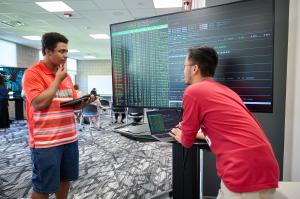UH among 15 colleges to launch Google Cybersecurity Clinics
University of HawaiʻiAssociate Professor, Business and Hospitality
Kelli Abe Trifonovitch, (808) 228-8108
Chief Communications Officer, UH Office of Communications
Beginning in January 2025, the University of Hawaiʻi Cybersecurity Clinics will offer a free online course in introductory cybersecurity topics to 500 UH students over five years. It will provide information and access to internships and career opportunities in cybersecurity. UH faculty will work with the students and provide mentoring and guidance through the process.
UH was selected to receive $1 million in grant funding and wraparound support from Google’s Cybersecurity Clinics Fund to establish the University of Hawaiʻi Cybersecurity Clinics. It is one of 15 new clinics set to launch at higher education institutions across the country, thanks to a collaboration between Google and the Consortium of Cybersecurity Clinics.
“Cybersecurity clinics at higher education institutions provide free digital security services to under-resourced organizations, similar to how law or medical schools offer free community clinics,” said UH Vice President for Information Technology and Chief Information Officer Garret Yoshimi. “UH’s new cybersecurity clinics will give students an opportunity to learn cybersecurity and artificial intelligence (AI) skills in a hands-on manner, while helping to protect vulnerable organizations and critical infrastructure—such as local small businesses, hospitals, schools and energy grids—from cyber attacks.”
Currently, there are nearly 450,000 open cybersecurity jobs available in the U.S., including more than 4,000 in Hawaiʻi, and demand for cyber professionals is projected to grow 32% by 2033. Cyber insecurity remains one of the top 10 global risks over the next 10 years, according to the World Economic Forum's 2024 Global Risks Report. To ensure that communities, critical infrastructure and businesses big and small across the U.S. are secure, a skilled, diverse and AI savvy cybersecurity workforce is required.
“The world is in a moment where emerging technologies, like AI, are creating both new opportunities and threats in the world of cybersecurity,” said Heather Adkins, vice president of security engineering at Google. “It’s essential that we invest in growing a strong, diverse and widespread cybersecurity workforce to help protect everyone—from critical infrastructure to small businesses and schools. The 15 clinics that we’re helping to establish serve a wide variety of students across all corners of the U.S. and we’re excited to see the impact they’ll have in their local communities.”
The University of Hawaiʻi Cybersecurity Clinics will be primarily based at UH Maui College but will collaborate with other campuses throughout the UH System. The project will also work with various organizations across the state, such as the CIO Council and local employers, to train workers to secure the critical infrastructure in Hawaiʻi.
In addition to $1 million, Google is offering volunteer mentorship from Google employees, Google Titan Security Keys (hardware passkeys that use two-factor authentication to protect Google accounts from phishing attacks and hacking), and scholarships for the Google Career Certificate in Cybersecurity.
"Google's transformative investment is catalyzing cybersecurity for the public good,” says Ann Cleaveland, co-founder and co-chair of the Consortium of Cybersecurity Clinics and executive director of the UC Berkeley Center for Long-Term Cybersecurity. “We congratulate the recipients and applaud these awards, which propel forward the vision of the Consortium to establish a cybersecurity clinic in every U.S. state by 2030."
The announcement builds on Google’s 2023 support for 10 clinics, part of a combined commitment to launch 25 Google-supported cyber clinics nationwide by 2025. Google.org has already committed more than $25 million to this project.

